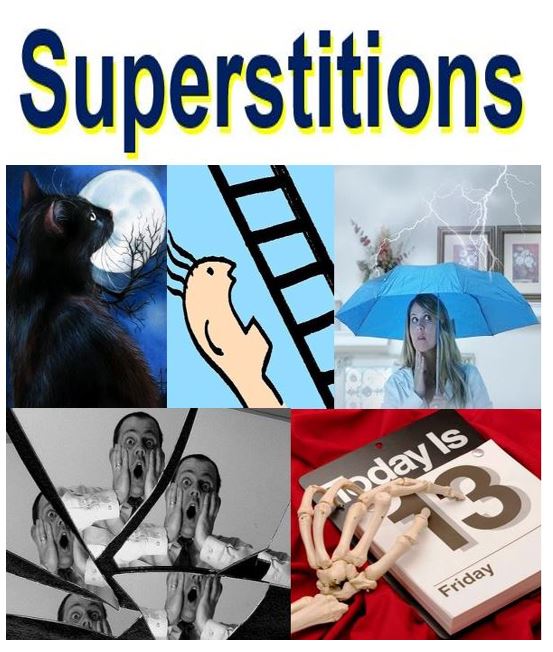Today is Friday 13th, a day many people fear is cursed with bad luck, tragic accidents and horrible events. However, two researchers in the UK say they have proved that the whole bad luck story is merely a myth – today is no more hazardous or luckier than any other day of the year.
Triskaidekaphobia – the extreme superstition regarding the number 13 – is widespread across much of the world. Paraskevidekatriaphobia – a superstitious fear of Friday 13th – is also a common phobia.
More than one quarter of all streets in the United Kingdom have no number thirteen. Houses on number 13 generally sell for less than properties on either side, even if they are identical. A high proportion of blocks of flats or offices have no 13th floor.
 Today is Friday 13th, but do not fear – you are in no greater danger of an accident or some horrible event today than in any other day of the year – a new study has concluded.
Today is Friday 13th, but do not fear – you are in no greater danger of an accident or some horrible event today than in any other day of the year – a new study has concluded.
Many people never travel by plane or undertake long car or train journeys on Friday 13th, for fear of dying or having an awful injury on that date. Airlines in Western Europe and North America say their bookings for Friday 13th are lower than on other days.
Dr. Fidrmuc said:
“On Friday June 13th 2014 flights on budget airlines were considerably cheaper in Austria, France, Sweden and the UK than on any other days that month.”
No link to bad or good luck
Economist Dr. Jan Fidrmuc, who works at the Department of Economics and Finance and Centre for Economic Development and Institutions at Brunel University, and Dr. Juan De Dios Tena Horrillo, from the University of Liverpool’s Management School, explained in the academic journal Kyklos (citation below) that the date is not at all linked to bad luck.
The authors say the bad luck is generally attributed to their being thirteen people at Jesus Christ’s Last Supper, one of whom later betrayed him, and his crucifixion, which took place on a Friday.
 The most common superstitions related to bad luck are seeing a black cat, walking under a ladder, opening an umbrella indoors, breaking a mirror, and Friday 13th, especially in Europe, North and South America.
The most common superstitions related to bad luck are seeing a black cat, walking under a ladder, opening an umbrella indoors, breaking a mirror, and Friday 13th, especially in Europe, North and South America.
Despite the long-held belief that Friday 13th was an ‘unlucky’ day, nobody had ever examined the phenomenon scientifically to determine whether this really was the case, that is, until now.
Dr. Fidrmuc and Dr. Tena Horrillo decided to find out whether Friday 13th was unluckier than the other days of the week or year. They said that selecting the right kind of data was vital. Going out and surveying a load of people would not be reliable, because many of them would just remember something awful that had happened on that ‘unlucky’ day.
Trying to gauge the outcomes of events, such as a wedding date or buying a house, is also very unreliable for several reasons. For example, superstitious people are not likely to do anything important on Friday 13th, which would distort the statistics.
Many people are suspicious of the number 13 on its own (without the Friday). According to official figures from the Office for National Statistics (they gather and analyze huge quantities of numbers), the number of weddings that occurred in 2013 was much lower than in 2012 and 2014.
Shopping declines considerably on Friday 13th, compared to other days – in fact, it drops by over $1 billion in the United States.
Study used UK Labour Force Survey data
The two researchers gathered and analysed data on four million people from the UK Labour Force Survey, the country’s largest household survey with information about people’s jobs, salaries, marital status and date of birth.
They focused on date of birth data, because no matter how hard we try, there is no way we can determine the exact day when a baby is born, apart from bullying a doctor into carry out a caesarean section on a specific date – not that easy in the UK.
The authors wanted to find out whether people born on Friday 13th were more (less) likely to have a job, have a higher or lower than average income, or remain single.
These outcomes, they argue, are extremely important for measuring people’s quality of life – which is linked to how lucky or unlucky a person has been.
Their findings showed that people born on Friday 13th, or just the 13th (not on a Friday) had similar outcomes to those born on other dates, i.e. their lives showed no evidence of more luck or bad luck.
In an Abstract in the journal, the authors wrote:
“We find little evidence that people born on the 13th or those born on Friday the 13th are significantly less likely to be employed, earn lower wages or that they are more likely to stay unmarried compared to people born on other days.”
Citation: “Friday the 13th: The Empirics of Bad Luck,” Jan Fidrmuc and J. D. Tena. Kyklos, Volume 68, Issue 3, pages 317–334. DOI: 10.1111/kykl.12085.
Video – Top 10 superstitions
Whether you believe in them or not, superstitions are very much alive, have been for centuries, and are likely to continue thriving for a very long time.
